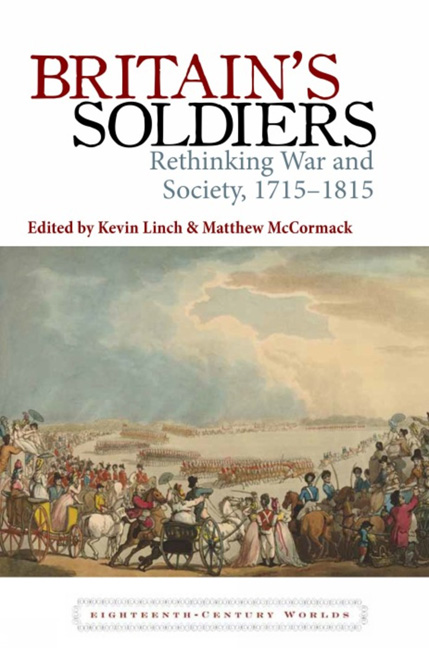Book contents
- Frontmatter
- Contents
- List of tables and figures
- Acknowledgements
- Notes on the contributors
- Introduction
- Part 1 Nationhood
- Part 2 Hierarchy
- 3 Effectiveness and the British Officer Corps, 1793–1815
- 4 Stamford Standoff: Honour, Status and Rivalry in the Georgian Military
- Part 3 Discipline
- Part 4 Gender
- Part 5 Soldiers in Society
- Index
3 - Effectiveness and the British Officer Corps, 1793–1815
from Part 2 - Hierarchy
- Frontmatter
- Contents
- List of tables and figures
- Acknowledgements
- Notes on the contributors
- Introduction
- Part 1 Nationhood
- Part 2 Hierarchy
- 3 Effectiveness and the British Officer Corps, 1793–1815
- 4 Stamford Standoff: Honour, Status and Rivalry in the Georgian Military
- Part 3 Discipline
- Part 4 Gender
- Part 5 Soldiers in Society
- Index
Summary
IT HAS LONG BEEN ARGUED that the British officer corps was typically ineffective or at best unscientific during the protracted wars against France. At the beginnings of his scholarly history of the British Army, John Fortescue accounted for the failings of the British campaign in the Netherlands by deploring the amateurism of the battalion officers, as well as many on the staff. Among modern historians, David Gates has argued that the army ‘sank into dereliction’ between 1783 and 1793, characterised by poor organisation and inadequate training. When wartime expansion followed, the officer corps increased in size too quickly to improve in quality. Only with the Peninsular War did continuous service foster qualitative improvements and raise the status of the army sufficiently high to attract better recruits as privates and later NCOs. Such an interpretation has been restated by Antony Clayton in his general history of the British officer corps. Yet, although reforms introduced at home by the Duke of York, including the establishment of the Royal Military Academy, whose cadets began entering active service during the Peninsular War, may have helped, expert contemporaries such as William Napier and A. H. Jomini saw a newly celebrated professionalism as the outcome not of ‘superior tactics or better armament but endurance and discipline’.
The case for enhanced effectiveness in war fighting remains contested. For example, Rory Muir attributed victory at Salamanca to excellent management in detail by Wellington and his army's high level of general competence in discharging orders and manoeuvring units. But, in a recent study of Waterloo, Alessandro Barbaro offers a more mixed assessment. While the long experience of fighting by 1815, and especially the rigours of the Peninsular War, meant that the British army at Waterloo was ‘more middle-class and more meritocratic than one might suppose’, Barbaro also argues that the more meritocratic composition of the officer corps ‘did not make it more professional’. Traditional values and the supremacy of adherence to a code of honour continued to apply: ‘The worth of a good officer was determined by the physical courage with which he led his men, and by nothing else.’
- Type
- Chapter
- Information
- Britain's SoldiersRethinking War and Society, 1715–1815, pp. 57 - 76Publisher: Liverpool University PressPrint publication year: 2014

